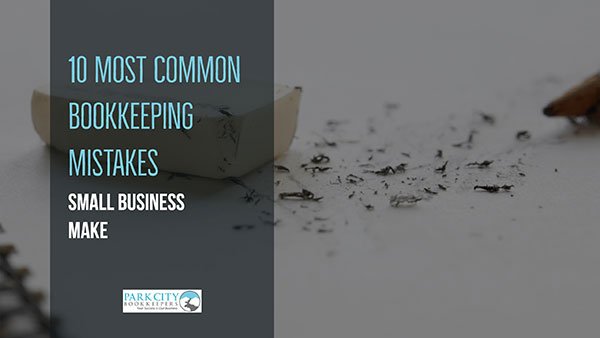Bookkeeping is one of the most critical functions within a business, and it is essential that every business keep accurate, properly classified records. While it is entirely possible to manage your own books, it is also very easy to make some common bookkeeping mistakes, which can sometimes prove costly and difficult to rectify. If you want to stay on top of your bookkeeping, here are 10 of the most common bookkeeping mistakes you need to avoid.
#1. Discarding receipts for minor expenses
The IRS typically does not seek receipts for items under $75, but you should still keep them because they may come in handy when you need to show evidence for certain deductibles at some point in the future. No matter how minor the expense, the IRS may, during an audit, require receipts for an aggregate of purchases, and not having them on hand may cause issues.
#2. Not keeping proper records of reimbursable expenses
This is one mistake small business owners make often. Company finances should be kept separate from personal funds, and this means when you make business purchases using personal funds, you should write these down and be sure to get reimbursed.
#3. Not using any bookkeeping software
No matter how simple you may think bookkeeping is, if you do not use any of the available bookkeeping software, you may make errors that can prove costly. Running a small business might mean that there is not enough bookkeeping work to justify hiring a full-time, permanent bookkeeping staff. However, a bookkeeping software can perform most of the basic functions and help you calculate tax deductions and generate payroll. It is recommended that you shop around since a lot of the software vendors offer customized packages you can choose from, depending on your needs.
#4. Wrongly classifying employees
Employees, contractors, and freelancers need to be categorized and treated differently for tax purposes. Typically, small business owners may not properly classify the various types of people they work with, leading to potential incidences of misfiled taxes.
#5. Not doing a bank reconciliation often enough
Bank reconciliations are one way to ensure that your bookkeeping is getting done accurately. They should be done on a regular basis, but small business owners may make the mistake of only doing them once in a while or doing them incorrectly if they do them at all.
#6. Not keeping proper backups
This is one of the most common bookkeeping mistakes small business owners make. At any given point in time, your business may be the subject of an IRS audit or even a private audit, and it will be necessary to provide a paper trail. Not having a backup of your records is a recipe for disaster. It is recommended that you keep both digitized and physical copies of all supporting documents and have them backed up to multiple locations.
#7. Not deducting sales tax from total sales
Not deducting sales tax or miscalculating it is a common bookkeeping mistake small business owners tend to make. Not deducting sales tax will lead to a deceptively high sales figure, without reducing the actual tax amount.
#8. Wrongly classifying major purchases as immediate expenses
Expenses are generally written off immediately, however, items purchased for long-term use, such as office equipment, are not considered expenses and should be classified as assets, which are depreciated over time.
#9. Poor petty cash management
Petty cash is cash at hand, which is meant to be used to take care of minor day-to-day needs of the business. As such, it is understandable that a lot of businesses tend to be a bit laid back about petty cash management, making it a very common bookkeeping mistake, but a dangerous one to make. The proper procedure is to fill out a petty cash slip each time it is disbursed, which can then be used to check how much petty cash was spent and for what.
#10. Not keeping records up to date
Your books need to be updated on a current basis in order to prevent simple mistakes and be useful for providing up-to-date information needed to make major financial decisions. Not keeping your books current will only add up to more work down the line, and the more you delay it, the more overwhelming it becomes to get your books in order. Often, small business owners who fall into this trap end up having to hire bookkeeping clean up services to sort through the mess and set things straight again.
Even if you have experience or an education in accounting, you may, as a small business owner, find yourself making one or more of these common bookkeeping mistakes. Often, the biggest mistake small business owners make is to take up the bookkeeping task on themselves, even though their own time can be spent more productively in processes which grow the business.
Typically, professional bookkeeping services have been costly, but now you can find tailor-made packages and pay only for the services your business needs at its current stage. Whether you are a small business owner who is just starting up, or one looking to expand, hiring a professional bookkeeping service can help ensure your books are error-free and in perfect order.

